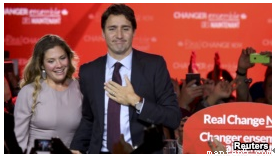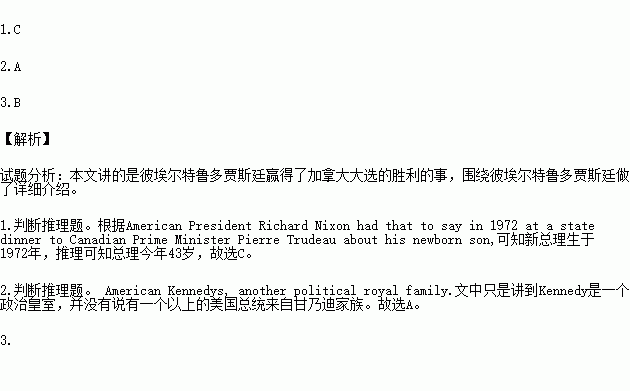题目内容
Liberal Party leader Justin Trudeau stands with his wife, Sophie Gregoire, as he gives his victory speech after Canada's federal election in Montreal, Quebec, Oct. 19, 2015.
“Tonight I'd like to toast(为……干杯) the future prime minister of Canada: to Justin Pierre Trudeau."
American President Richard Nixon had that to say in 1972 at a state dinner to Canadian Prime Minister Pierre Trudeau about his newborn son, Justin. Forty-three years later, Justin Pierre Trudeau has become the second-youngest prime minister in Canada. His Liberal Party(自由党) won a majority in Monday's national election over the Conservative Party(保守党).
Justin Pierre Trudeau came from Canada's political royalty. He is the son of Pierre Trudeau and Margaret Sinclair Trudeau. His father, Pierre Trudeau, served two terms as Prime Minister between 1968 and 1984. His mother, Margaret Sinclair Trudeau, came from a well-known family of politicians. She married the 51-year-old prime minister when she was 22. Margaret Trudeau was known for her partying at New York nightclubs with stars like the Rolling Stones. The couple inspired "Trudeaumania" and was frequently compared to the American Kennedys, another political royal family.
Young Trudeau graduated from McGill University in 1994. He spent his early years as a schoolteacher in Vancouver. He is married to Sophie Grégoire, a former broadcaster. They married in 2007. They have three children.
Justin Pierre Trudeau is promising "real change" in domestic and foreign policy. He told supporters earlier Tuesday that a positive campaign led to the victory.
"This is what positive politics can do," Trudeau said. "Canadians from across this great country sent a clear message tonight."
Mr. Trudeau promises to invest(投资) in rebuilding roads and bridges. He also plans to raise taxes on wealthy Canadians.
Like his father before him, the young Trudeau has already received international attention on his election as prime minister. Major American newspapers like the New York Times and Wall Street Journal published his victory on the front pages. News websites from Le Monde of Paris to the Times of London headlined the return of "Trudeaumania" in their coverage.

1.How old is the new Canadian prime minister?
A. 51 B. 47
C. 43 D. The text doesn’t tell us.
2.Which of the following statement is WRONG?
A. There is more than one American president coming from Kennedy family.
B. Justin Pierre Trudeau will continue the political view "Trudeaumania"
C. Justin’s positive campaign won many voters(选民).
D. Justin Pierre Trudeau has attracted wide attention of the Press.
3.What’s the main idea of the text?
A. Liberal Party has been the leading party in Canada.
B. Justin Pierre Trudeau won a victory in Canada's election
C. A great political royal family in Canada.
D. A new political star and his happy family.
 阅读快车系列答案
阅读快车系列答案
